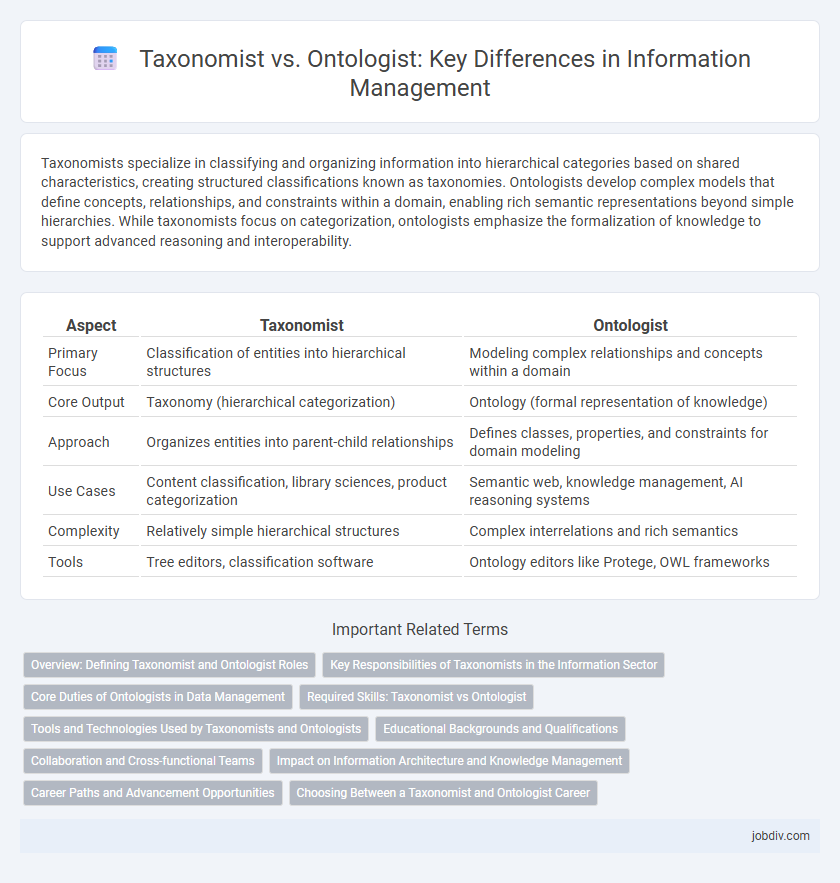Taxonomists specialize in classifying and organizing information into hierarchical categories based on shared characteristics, creating structured classifications known as taxonomies. Ontologists develop complex models that define concepts, relationships, and constraints within a domain, enabling rich semantic representations beyond simple hierarchies. While taxonomists focus on categorization, ontologists emphasize the formalization of knowledge to support advanced reasoning and interoperability.
Table of Comparison
| Aspect | Taxonomist | Ontologist |
|---|---|---|
| Primary Focus | Classification of entities into hierarchical structures | Modeling complex relationships and concepts within a domain |
| Core Output | Taxonomy (hierarchical categorization) | Ontology (formal representation of knowledge) |
| Approach | Organizes entities into parent-child relationships | Defines classes, properties, and constraints for domain modeling |
| Use Cases | Content classification, library sciences, product categorization | Semantic web, knowledge management, AI reasoning systems |
| Complexity | Relatively simple hierarchical structures | Complex interrelations and rich semantics |
| Tools | Tree editors, classification software | Ontology editors like Protege, OWL frameworks |
Overview: Defining Taxonomist and Ontologist Roles
Taxonomists specialize in classifying and organizing information into hierarchical structures based on categories and relationships, facilitating efficient data retrieval and management. Ontologists develop comprehensive frameworks defining entities, concepts, and their interrelations within a domain to enable advanced semantic understanding and interoperability in knowledge systems. Both roles are essential in structuring information, with taxonomists focusing on categorization and ontologists emphasizing semantic depth and formal representation.
Key Responsibilities of Taxonomists in the Information Sector
Taxonomists in the information sector specialize in organizing and categorizing data to enhance searchability and retrieval by creating hierarchical classification systems and controlled vocabularies. They analyze subject matter, develop consistent metadata standards, and ensure accurate tagging of digital assets to support information architecture and improve user experience. Their expertise enables efficient content management, facilitating knowledge discovery and interoperability across various information systems.
Core Duties of Ontologists in Data Management
Ontologists in data management specialize in creating and maintaining comprehensive ontologies that define the relationships between data concepts across complex systems. Their core duties involve designing semantic frameworks that facilitate data interoperability, consistency, and enhanced knowledge representation. By structuring data with precise semantic relationships, ontologists enable more effective data integration, querying, and inferencing in large-scale information environments.
Required Skills: Taxonomist vs Ontologist
Taxonomists excel in classification, metadata management, and controlled vocabularies, requiring strong skills in hierarchical organization and domain expertise. Ontologists focus on knowledge representation, formal logic, and semantic modeling, demanding proficiency in ontology languages like OWL and reasoning tools. Both roles necessitate analytical thinking, but ontologists require advanced technical skills in computational semantics and AI integration.
Tools and Technologies Used by Taxonomists and Ontologists
Taxonomists primarily utilize classification software and metadata management tools such as PoolParty and Synaptica to organize hierarchical structures and controlled vocabularies. Ontologists employ ontology editors like Protege and WebODE, enabling the construction and reasoning over complex relationships and axioms within domain-specific ontologies. Both professionals increasingly integrate semantic web technologies including RDF, OWL, and SPARQL for enhanced data interoperability and knowledge representation.
Educational Backgrounds and Qualifications
Taxonomists typically hold degrees in library science, information science, or biology, emphasizing skills in classification and categorization practices. Ontologists often possess advanced qualifications in computer science, artificial intelligence, or knowledge engineering, concentrating on formal modeling and semantic relationships. Both roles require specialized training, but ontologists generally have a stronger foundation in logic and formal representation languages such as OWL or RDF.
Collaboration and Cross-functional Teams
Taxonomists and ontologists collaborate by combining hierarchical classification systems with complex relationship models to enhance data organization and retrieval. Cross-functional teams leverage their expertise to develop robust knowledge frameworks that improve semantic search, metadata management, and AI integration. Effective collaboration bridges taxonomy's structural clarity with ontology's semantic depth, enabling more precise information architecture and business intelligence solutions.
Impact on Information Architecture and Knowledge Management
Taxonomists structure information by creating hierarchical classification systems that enhance retrieval efficiency in information architecture. Ontologists develop formal ontologies that define complex relationships and enable semantic interoperability in knowledge management systems. Both play critical roles in organizing data, but ontologists provide richer context and reasoning capabilities, improving decision-making and information discovery.
Career Paths and Advancement Opportunities
Taxonomists specialize in classifying and organizing information into hierarchical structures, primarily focusing on metadata and controlled vocabularies, which opens career paths in library science, digital content management, and information architecture. Ontologists develop complex models that represent knowledge domains using formal logic to enable semantic interoperability, with advancement opportunities in artificial intelligence, knowledge management, and advanced data science roles. Both career paths offer growth through specialized expertise in information systems, but ontologists often engage in cutting-edge projects involving AI-driven knowledge representation and reasoning.
Choosing Between a Taxonomist and Ontologist Career
Choosing between a taxonomist and ontologist career depends on interests in organizing knowledge versus structuring complex relationships within data. Taxonomists specialize in classification systems, creating hierarchical categories primarily in biology or information science, while ontologists develop ontologies that define entities, attributes, and their interrelations across domains. Career growth in taxonomy often centers on library science, ecology, or content management, whereas ontology work is pivotal in artificial intelligence, semantic web technologies, and knowledge representation fields.
Taxonomist vs Ontologist Infographic

 jobdiv.com
jobdiv.com